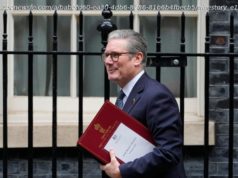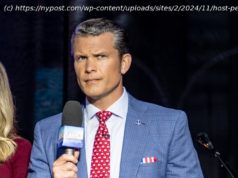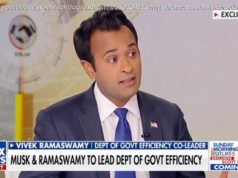Lawmakers have no clear consensus on even incremental changes to gun restrictions, let alone more sweeping legislation.
WASHINGTON — Lawmakers will return to Washington on Monday facing intense public pressure to break their decades-long gridlock on gun control, a demand fortified by a bipartisan group of governors calling for Congress to take action to protect against mass shootings.
But even as members of both parties said it might be difficult for Congress to remain on the sidelines after the school massacre this month in Parkland, Fla., lawmakers have no clear consensus on even incremental changes to gun restrictions, let alone more sweeping legislation.
Over a weeklong recess, Republican leaders in both the House and the Senate remained largely silent on gun legislation, a reflection of the significant obstacles to passing even modest measures this year.
Many Republicans fear primary challenges from the right in the midterm elections this fall and do not want to be pushed into difficult votes. Democrats are not eager for legislation that they deem too incremental. And with lawmakers of both parties looking to wrap up their work to focus on their campaigns for re-election, the time to pass any significant legislation is running short.
If the past is prologue, Congress will do nothing.
But governors who gathered in Washington for their annual winter meeting warned of the perils of inaction. Animated by a wave of polling since the Florida massacre, Democratic governors warned that candidates would pay a political price for opposing new gun regulations, and some of their Republican counterparts conceded that the pleas of voters could no longer be ignored as they increasingly abandon the party.
“I think for Republicans our challenge in the next race is going to be about appealing to the suburban vote that hasn’t been so good for Republicans the last few races,” said Gov. Bill Haslam of Tennessee, citing in particular suburban women. It is clear, he added, that “people want to see action.”
The combination of political pressure from the governors and moves by President Trump to embrace certain limited measures opposed by the National Rifle Association could set up a congressional showdown with the powerful firearms lobby not seen since the gun debate that followed the deadly school shooting in 2012 in Newtown, Conn.
The sudden focus on guns is likely to complicate an already busy agenda. Congress left Washington without coming up with a replacement for the Deferred Action for Childhood Arrivals program, which protects hundreds of thousands of young immigrants from deportation and expires next week. A contentious debate over gun legislation could push immigration to the back burner.
While the Newtown massacre and the many that have followed have produced familiar scenes in which Democrats push for tough new gun restrictions and Republicans dig in and resist, the latest mass shooting appears to have shifted the landscape, even if just slightly, as the Parkland students have become overnight gun control advocates and media fixtures.
A smattering of congressional Republicans — including some who have been staunchly opposed to gun control legislation — now suggest that they would be willing to take at least small steps toward restricting gun rights.
After being jeered at a forum televised on CNN, Senator Marco Rubio, Republican of Florida, said last week that he would reconsider his opposition to limiting high-capacity magazines. Another Florida Republican, Representative Brian Mast, an Army veteran who lost both of his legs to a roadside bomb in Afghanistan, called for a ban on the purchase of assault weapons.
Gun control advocates are looking toward the changing political climate in Florida, where the Republican governor, Rick Scott, and state lawmakers defied the N. R. A. in proposing to raise to 21 the minimum age to buy any firearm.
Senator Jeff Flake, Republican of Arizona, is partnering with Senator Dianne Feinstein, Democrat of California, on legislation that would raise to 21 from 18 the age threshold for purchasing assault weapons like the AR-15 used to kill 17 people in Parkland.
A poll released by CNN on Sunday, which showed support for stricter gun laws at levels not seen since the early 1990s, found that 71 percent of Americans backed barring those under 21 from buying any type of firearm.
“I don’t know if crossing the Rubicon is the right historical analogy, but there is a sense that this is different,” Mr. Flake said, adding, “Where the public is and where some Republicans have been on some of these issues just doesn’t match, and I do think we’re going to have to deal with it.”
Senator Pat Roberts, Republican of Kansas, a longtime ally of the N. R. A., has said he would back such an age-restriction proposal. “Certainly nobody under 21 should have an AR-15,” he told reporters in Kansas last week.
Mr. Flake, however, is not seeking re-election, and Mr. Roberts, 81, is unlikely to run again in 2020.
At the governors’ meeting, there was agreement on the issue between Democrats and some Republicans. “We do it for alcohol; we’re talking about raising the age for tobacco to 21,” said Gov. Gary R. Herbert of Utah, a Republican. “I think that’s worth talking about.”
Senator Christopher S. Murphy, Democrat of Connecticut, said that with such talk among Republicans, “this feels like a watershed moment.”
“You’re seeing some significant and meaningful cracks in the bond that traditionally holds the Republican Party together,” he said. “The question is: Are those cracks enough to get something done?”
Gun rights advocates said the answer was no. “This, thus far, has shown no different a dynamic than any of a dozen fights over the past two decades,” said Michael Hammond, legislative counsel for Gun Owners of America, which has fought gun control measures for decades. “People who, after a week, suggest that this is a tipping point either weren’t around during previous battles or failed to learn the lesson.”
Some Republicans, warning against a rush to enact new laws, appeared inclined to respect the wishes of the N. R. A., even as the group came under pressure from some corporate leaders, who were moving to cut ties with it.
“I think there’s a temptation just to do a whole host of things that are not really addressing the fundamental problem but would make people feel better that they’ve done things,” said Gov. Asa Hutchinson of Arkansas, who has deep ties to the N. R. A., explaining his opposition to raising the age limit.
Representative Thomas Massie, Republican of Kentucky and the chairman of the Congressional Second Amendment Caucus, warned that Republicans who had run for office on a platform that included protecting gun rights would face political consequences if they changed their tune.
“I suspect that a majority of Republicans are not going to turn on their base,” Mr. Massie said.
While such sentiment makes it unlikely that lawmakers will consider sweeping new gun restrictions, Congress is considering a number of more modest proposals.
In the House, 19 Republicans, led by Representative Leonard Lance of New Jersey, sent a letter on Friday to Speaker Paul D. Ryan, calling on him to schedule a vote on a measure that would require states and federal agencies to do a better job of reporting legal and mental health records to the National Instant Criminal Background Check System, or NICS.






